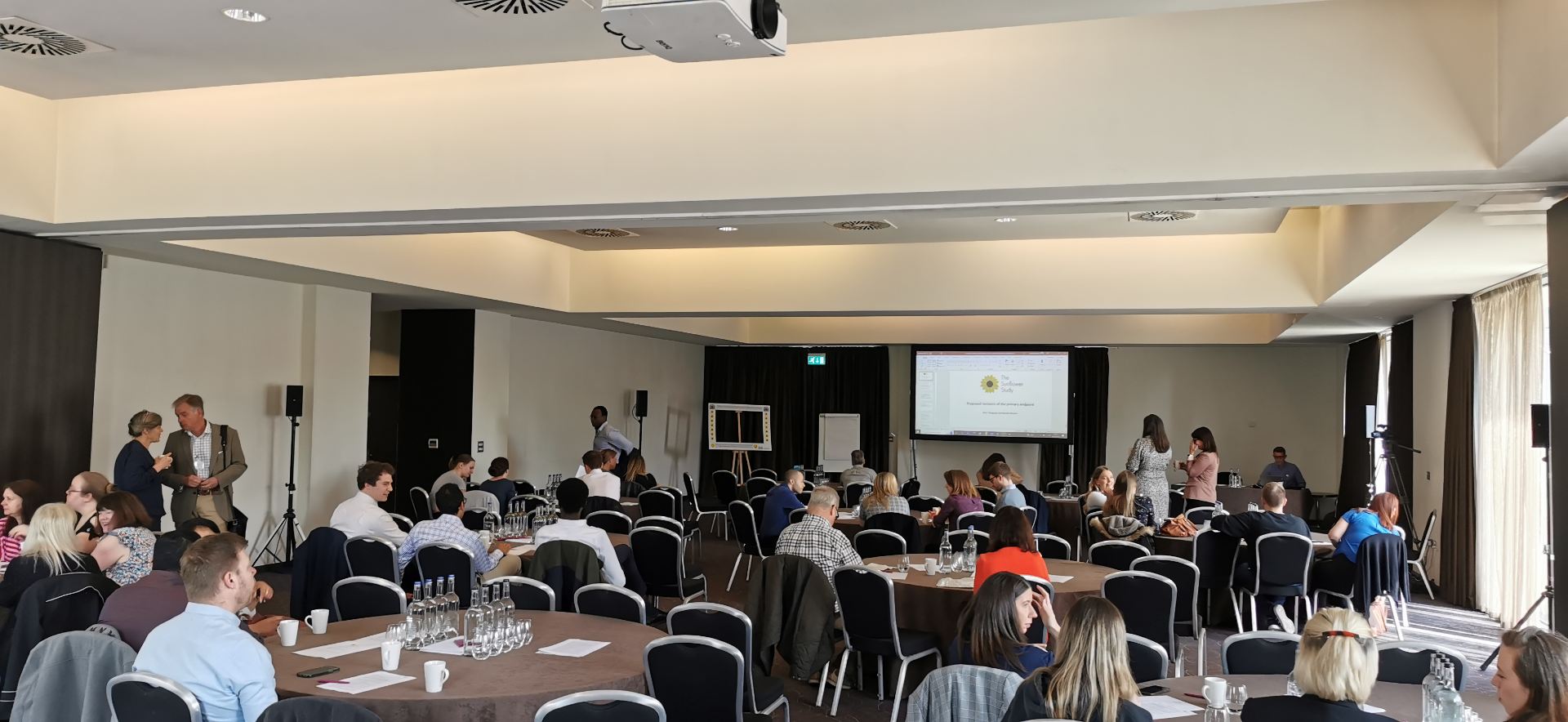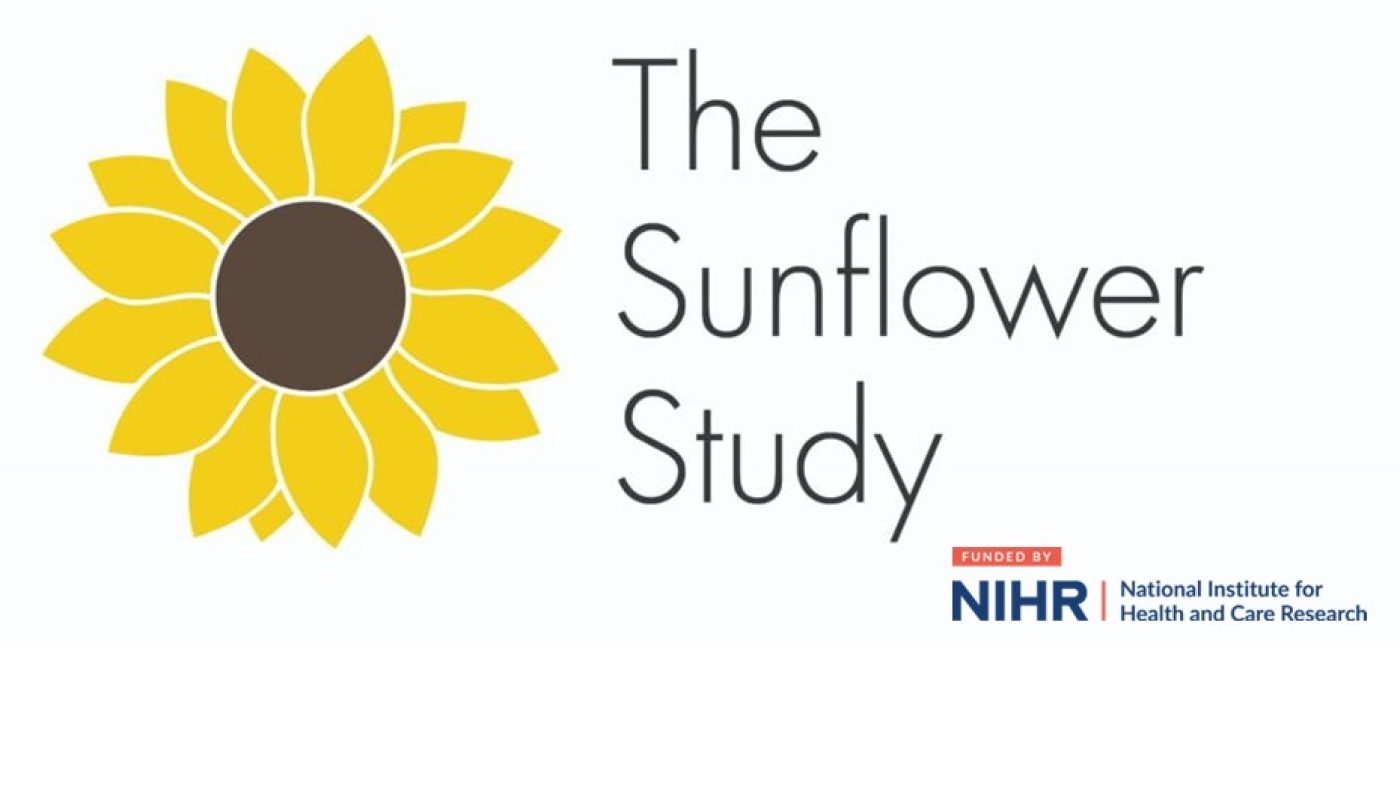Report from the Sunflower study 5th Investigators Meeting
Birmingham, Thursday 18th May 2023

Eighty-four representatives from 28 study sites attended our fifth Sunflower investigators’ meeting in Birmingham on Thursday 18th May 2023. There were a series of talks from the study team and from representatives from recruiting centres, and a strong focus on audience participation with challenges aired and many solutions shared. Study CI, Professor Giles Toogood, described it as a really good day and hoped that it would provide the impetus for sites to continue to recruit well.
This report provides an overview of the talks.
Welcome and study update
Giles Toogood and Marcus Jepson
Giles and Marcus welcomed us to the meeting and began by explaining the purpose and design of the study. They gave a reminder of the eligibility criteria and the complications being recorded for the primary outcome.
The important study milestones were outlined, reminding us all of the progress from when the first patient was randomised in 2019, through to the 5000th on February 7th 2023.
Giles outlined the current proposal for a reduced recruitment target, which at the time of the meeting was under consideration by the funder.
Slides: Investigator Meeting 2023 – Study Update
The focus of the meeting then moved to experiences from the sites, with presentations outlining successful recruitment strategies;
- A site who had successfully re-activated recruitment
The team from Nottinghamshire Healthcare NHS Foundation Trust
PI Edward Alabraba and team members Rachel Spence, Dawn Felix and Nicholas Southorn shared their recruitment successes, having recruited a record 51 patients during March 2023.
The team held a strategy meeting early in the year and collectively renewed their efforts. They streamlined their consent and booking process from the surgical triage unit, they reminded registrars of the trial, and encouraged consultants to keep the study in mind too.
Research nurses search online notes for possible participants, and attend clinics.
They have added an automatic reminder on electronic MRCP requests for suspected bile duct stones to consider the patient for Sunflower, with a reminder of the local study email address. This has helped reduce the number of ‘routine’ MRCPs being undertaken.
To increase recruitment of elective patients, they screen all outpatient HPB clinic lists weekly, highlighting every patient who fits the eligibility criteria. They also carry out daily screening of all surgical admission and HPB wards.
The team created a colour-coded calendar so they never miss a clinic where an eligible patient is attending.
Once a suitable patient is found and listed for Lap Chole, the team make contact over the phone and provide the patient information sheet followed by consent either by post or using the new e-consent system.
Finally, the team pointed out that being embedded within the clinical teams is vital, as they “support and accommodate our presence and work”.
Nick Southorn, the current Associate PI, then outlined his role and explained that the opportunity to become API is open to staff in several different roles. Nick is an Advanced Clinical Practitioner (ACP), with training and clinical experience in both surgery and medicine. Being permanently based at the hospital is an advantage in many ways, for example, Nick has implemented several changes to enhance recruitment.
He told us that previously, patients were identified in STU and referred to hot biliary clinic (HBC), which placed the burden of virtually all recruitment on the HBC clinician or research practitioners. This changed when the local governance team agreed that patients can be informed, consented and booked for Lap Chole during their acute admission.
Slides: Nottingham Site Presentation
- Team working and recognising contribution
The team from Gloucestershire Hospitals NHS Foundation Trust
Next, PI Thomas Walker and API Oliver Brewster, from Gloucester gave a presentation on team working and recognising contribution. They attribute much of their success to their hard-working research nursing team alongside the new intake of registrars. They aim to recruit ten patients per month by targeting emergency admissions, catching all potential patients in clinic, and maintaining motivation within the team.
They have linked up with two GI specialist radiologists who agreed to the necessary approx. 3-5 MRCPs per month, and to expedite scans for ‘hot’ Lap Chole so that these patients can be recruited.
Competition between sites was identified as a great motivator, as well as the API scheme. In response to a recent bad month, the team looked into the causes and stepped up their efforts to have a rota covering surgical assessment clinics and going over elective lists for missed patients.
The team’s ‘Take home messages’ are to enlarge your team whenever possible, bringing in junior and middle grade doctors. They suggest targeting the emergency take, and overall, keeping the pressure on.
Slides: Gloucester Site Presentation
Trainee strategies to support recruitment
Lucy Scott, Hannah Byrne and the Trainee Executive Group
Lucy and Hannah, the National Trainee Representatives, and Cho Ee Ng, Trainee Executive Group Member and social media expert gave an update on the trainee activity on the study.
Regional representatives are now in place in each area of the UK, covering three to six recruiting sites each.
The meeting was asked to think of three words to describe the benefits of trainee involvement in Sunflower, which were gathered using advanced technology into a ‘wordcloud’. Above all, attendees believe that trainees can contribute to recruitment, and also enthusiastically increase awareness and engagement with the wider team.
Thoughts on the barriers to recruitment were also collected by Lucy and Hannah. The main issues highlighted were time/workload pressure and lack of available staff and resources. Lack of engagement and buy-in were also identified, and a few attendees mentioned access to MRCPs.
A survey of sites’ use of the ’12 top tips’ promoted before Christmas, showed that the more tips sites employ, the more likely they are to recruit more patients each month – with a potential ten fold increase!
The top tips for recruitment and other useful resources can be found on the Sunflower website in the ‘Surgical Trainee’s’ section: https://sunflowerstudy.blogs.bristol.ac.uk/surgical-trainees
Additional tips suggested by sites include having a local Sunflower team WhatsApp, a designated staff member to contact patients when GP letters go out, and reaching out to junior doctors personally when they rotate.
The team said Trainees are indispensable to the Sunflower Study and we want to get as many involved as possible!
They urge sites to engage with the recently appointed regional reps for help with collaboration between sites and arrange opportunities to share knowledge, as well as friendly competition.
Slides: Sunflower Trianee Involvement Presentation
New Endeavours
Utilising radiology to support recruitment
Harry Corker, Leeds; Lucy Scott – Grimsby re. Alerts
After lunch, we heard from Harry Corker about his experience as a Radiology API. Harry is one of the very few radiologists who have completed the scheme.
Harry set out to increase his knowledge of research with the 6 month API training opportunity and became an important member of the team, being the link between the study team and the radiology department. He found the Pando app very useful for communication.
Important features of the role include vetting scan requests and acting as a point of contact and information for the MRI radiographers.
The benefits of a radiology API are extensive, and are very likely to raise a site’s recruitment figure. But they face many challenges, such as limits to MRI capacity, long waiting times, barriers to completing some of the API tasks which are more tailored to surgeons, and being the sole radiology team member.
Harry suggested that the best ways to support your radiology API (if you have one) are to include them in team meetings and provide them with the materials they need to promote the study to their colleagues, such as the staff-facing poster.
Lucy then explained how she was able to set up an automatic electronic alert on ultrasound reports. It gave brief inclusion criteria for Sunflower together with a named contact to approach.
Lucy also created posters for the radiology department highlighting the study and encouraging staff to add a specific autotext to patient reports to alert the team.
This approach has led to the identification of several more patients at St James’s hospital in Leeds than would have been found otherwise, both inpatients and outpatients.
Slides: Radiology Experience and Suggestions
Sunflower Recruitment from Private Hospitals
Giles Toogood and team, Leeds
Sunflower now has gained agreement with Spire Hospitals to recruit NHS patients seen in Spire clinics. This is now taking place in Leeds and over 30 patients have been randomised through this pathway. Once the patient has agreed to enter Sunflower the research team from Leeds Teaching Hospitals Trust contact the patient to discuss the trial further and to establish whether they need an MRCP. If the patient needs MRCP this is done in the Trust. The details of the operation and follow up are passed on to the research team from the surgeon who performs their surgery at Spire.
Hopefully this pathway can be replicated in other centres, especially ones where there is a Spire Hospital in town since this pathway has been agreed with Spire centrally.
Initial findings from the Sunflower Seed project
Samir/Natalie, Leeds
Samir Pathak had pre-recorded a presentation explaining the progress of the sub-study, or Sunflower Seed, ‘Analysing the risk of retained CBD stones in patients with LFT derangement and biliary symptoms: Informing recruitment to the Sunflower Study’.
The project is led by surgical trainees around the UK, some of whom have now become consultants.
Challenges were identified in the internal pilot phase of the study, for example, some clinicians were hesitant to recruit certain patients, and others felt that the inclusion criteria, in particular the LFTs, could be extended. This led to marked variation in recruitment.
To explore further and potentially change the eligibility criteria to include more patients with LFT derangement, Samir and the team carried out a retrospective service evaluation over a 6-month period with a one year follow up.
In total, 619 medium to high risk patients within and outside of the study criteria were identified on ICD-10 codes. About 70% had acute cholecystitis, and 16% pancreatitis.
Only 58% were found to have stones. Almost half the patients had MRCP but only a third had CBD stones. Only a quarter had ERCP but almost 80% of these had stones, “suggesting that we are good at predicting patients at high risk of stones”.
Secondary analysis are on the way, and the team hopes to give an update on inclusion criteria in the near future, and a publication.
Thank you to all sites involved in this work.
Slides: Sunflower Seed Project
Video:
Implementing eConsent and PPI perspective
Stephen Palmer, including Kerry Avery’s work
Trial Manager, Stephen Palmer, then gave an overview of the eConsent process, not possible for Sunflower.
This is a remote consent method using REDCap to allow sites to consent patients remotely, introduced in July 2022, to work alongside face-to-face and postal consent. It is hoped that eConsent will help recruitment rates, save time, and reduce errors.
Patients are offered this electronic option, a time is set when the patient can access a phone and their emails. The PIL and consent form are sent by email in advance, then the patient receives an email with a link to the form while on the phone to a staff member.
We have trained 32 sites in short 30 minute sessions, of which 21 sites have successfully used the system and feedback is good. At these sites, 24% of consents come via the electronic system.
Team members Kerry Avery and Liz Booth held patient interviews as part of their PPI work, this showed that eConsent is considered beneficial. Focus groups highlighted potential challenges but overall were in favour.
Please ask for training if you are keen to use this method.

